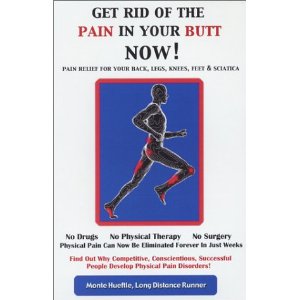Forgiveness v. Procrastination
From PsyBlog: Procrastinate Less By Forgiving Yourself:
Because we tend to avoid things that make us feel bad, pent up guilt about a task will make us avoid that task in the future. Self-forgiveness, though, may reduce guilt and so make us more likely to approach the task.
Your Chronic Pain Library
Gotten through The Mindbody Prescription and the other titles listed on this site’s pain page? Here’s another to consider–some like it better than the rest: Get Rid of the Pain in Your Butt Now! by Monte Hueftle.
Hueftle, a TMS Coach and Hypnotherapist, has also put together a full TMS course, The Master Practice, available through his website, RunningPain.com. No word on that yet–let me know how it goes.
Exercise and Sleep
From the NYT: Does Exercise Help You Sleep Better? Maybe, maybe not.
[T]he most practical advice that science can offer at the moment about exercise and sleep is not to fret too much about whether you’re getting enough of either. Worrying, as the Swiss study showed, is what will keep you awake long into the night.
Guided Meditation Page
Alongside lots of other downloadable/streamable stuff at audiodharma.com, here’s a page of Guided Meditations (also downloadable and streamable). Lots to choose from–different approaches, different voices, different lengths, from 5 minutes to 50.
Therapy Apps
From NPR: Mental Health Apps: Like A ‘Therapist In Your Pocket’.
[On one app,] [t]hroughout the day at random times, a “mood map” pops up on a user’s cell phone screen. “People drag a little red dot around that screen with their finger to indicate their current mood”…Users also can chart their energy levels, sleep patterns, activities, foods eaten and more, she says.
Study: Be Nice
Newsflash? Daily Appreciation Helps Romance. In study-ese:
“Gratitude triggers a cascade of responses within the person who feels it in that very moment, changing the way the person views the generous benefactor, as well as motivations toward the benefactor. This is especially true when a person shows that they care about the partner’s needs and preferences.”
The Future v. Fibromyalgia
From PsychCentral: Cell Phone Therapy for Fibromyalgia. Virtual reality and accelerometers! Background:
Fibromyalgia is a complex and chronic pain syndrome which causes generalized pain and deep exhaustion, among other symptoms. It is a serious public health problem, more usual among adult women, and causes significant negative psychological effects. In fact, 35 percent of affected patients suffer from depression and anxiety.
A TMS/stress illness doc might want to look into which came first…
Overdoing It (Kids’ Sports Edition)
Jane Brody surveys the kids’ sports landscape, and pulls a bracing quote from Until It Hurts: America’s Obsession with Youth Sports and How It Harms Our Kids, by Mark Hyman:
“Every year more than 3.5 million children under 15 require medical treatment for sports injuries, nearly half of which are the result of simple overuse.”
Your Brain on Love
A study shows scans of love-struck brains look the same in China as they do in the West.
Regions of the brain related to addiction and even mental illness light up on the scan when a person sees a photo of his or her beloved…[New] scans showed that love lights up the brain in the same manner, regardless of ethnic background.
Against “Halfalogues”
From the Los Angeles Times: Cellphone conversations we overhear really bug us. “Hafalogues” distract, annoy, and impair, says a study:
[P]articipants were seated at computers and asked to perform various cognitive tests while exposed to one of the three sounds or silence. Hearing the halfalogue was the only background noise that distracted the study participants and lowered their scores on the cognitive tests.
